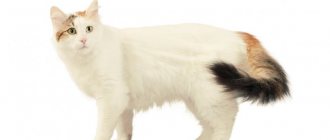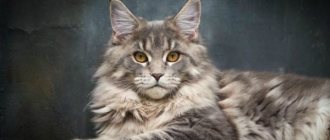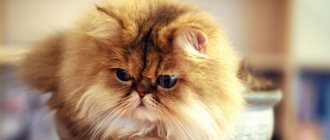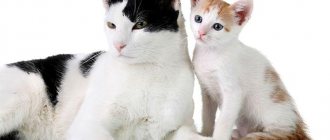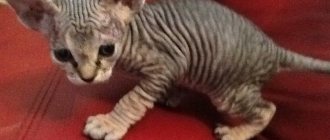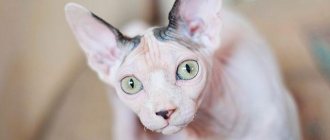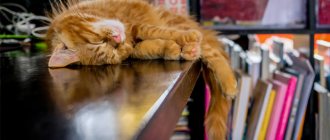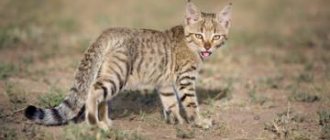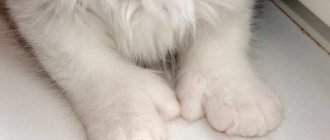Siamese cats often suffer from viral infections and metabolic disorders, which significantly affects their life expectancy. However, with proper care, representatives of this breed are able to cross the twenty-year mark.
Let's find out how long Siamese live, what other factors affect their health and how to delay the aging process of your beloved pet.
History of the origin of the breed
It is believed that the birthplace of Siamese cats is Thailand, especially since several centuries ago, this territory was called Siam. Here, cats were almost sacred animals, since it was believed that they guarded temples and also accompanied the dead to the other world.
The Thais were confident that fate always favored animals that were distinguished by their creamy coat color. Cats had their own sacred halo, so scientists dedicated their works to them. To this day, the National Library of Thailand houses an ancient work called Tamre Maew, which translated means “treatise on cats.”
A couple of centuries ago, the Society for the Protection of Siamese Cats from Extinction was created in Thailand. Already in 1870, the Siamese cat was presented to Queen Victoria of England as a gift. Everyone liked the breed, so after 2 years the public was introduced to the purebred cat Pudles.
Interesting fact! The first breed standards for Siamese cats were described two decades later, and the “Siamese Cat Club” in England was organized only in 1901.
It took another eight years for a similar club to appear in the United States. Despite this, the Americans had to revive this breed almost from scratch 40 years later in post-war Europe. In 1966, a document appeared that presented updated standards for the Siamese cat.
Somewhere in the late 60s, this breed appeared in the Soviet Union. As a rule, the first owners of Siamese cats were the intelligentsia of Moscow, as well as representatives of bohemians.
How long do they live?
Castrated
Many cat owners mistakenly assume that castration or sterilization of an animal shortens its life by a significant period. This statement contradicts real facts: castration does not shorten the life of a little friend, but, on the contrary, increases the average life expectancy by 2-5 years!
Moreover, a neutered cat, even at an advanced age, maintains an active lifestyle and playfulness.
In addition to the above data, castration of a cat can also harm longevity: poor nutrition after surgery, tissue infection and other ailments are hidden behind insufficient attention to the postoperative period. To avoid negative consequences, you need to carefully monitor your four-legged friend, because his future life depends on it.
Homeless
Even purebred cats often find themselves without a roof over their heads. Stray animals significantly reduce their existence due to malnutrition and many infections, so that on average a stray Siamese cat lives 3-4 years. This is due to the fact that animals get sick, and no help can be expected from humans.
Also among yard animals there is a high risk of death from an accident: without their own home, once pets are forced to sleep in the open air, which leads to adverse consequences.
Siamese cat: description
The breed represents a Siamese-oriented group. The appearance of these animals does not exactly resemble an terrestrial animal, but speaks more of an extraterrestrial origin. The head shape of Siamese cats is wedge-shaped, but the ears are huge, like locators. The eyes are somewhat elongated and have a bright blue color.
The cat's body is flexible and refined, and there is complete harmony with the size and shape of the head. The legs are long (comparatively) and powerful, which indicates the excellent physical shape of the animal.
Siamese cat breed description
Cat color
After birth, it seems that the kittens are albino, since they do not have a characteristic color, but this is not the case, since after a few days the removed pigmentation of the coat appears. By six months the main color (color point) appears, especially by 10 months.
At the same time, darker shades begin to appear on such parts of the body as the muzzle, ears, paws, and tail. The older the cat becomes, the less noticeable the difference between the general background and the colored parts of the body.
The following shades of spots are considered characteristic of the breed:
- Blue point - blue.
- Lilac point – lilac.
- Seal point is dark brown.
- Chocolate point – chocolate.
- Tetby Point is a brindle-striped breed.
- Red point is red.
- Other.
Interesting moment! In the USA, the first four types of color are considered officially recognized, compared to Europe, where up to 18 shades of color of the Siamese cat breed are allowed.
Breed standards
The Siamese cat is a slender and graceful, as well as flexible and muscular animal, while females are smaller in size and weight.
The neck is long, the head is wedge-shaped, with widely set ears, which especially distinguishes the wedge shape. The muzzle is designed in the form of a mask, which does not extend to the upper part of the head and does not come into contact with the areas of the ears.
The eyes are more like tonsils that are placed obliquely. The iris of the eyes is colored either dark blue or bright blue.
The skeleton is powerful, the muscles are well developed, and the body has a tubular shape. The legs are elongated and the paws are oval. The tail is relatively long and relatively thin, tapering towards the end. The coat is short and lies well to the body. The painted areas of the body are characterized by an even, uniform coloration.
The following are considered to be defects in the breed:
- Presence of white spots and white toes.
- Having an incorrect bite.
- Various colors of the iris, except blue-blue.
- Different number of fingers.
- Uneven or crochet ponytail.
- Exhaustion.
Personality of the Siamese cat
Siamese cats are quite obstinate, but at the same time very good-natured. A cat may dislike one of the family members, and for the rest of its life.
If she loves someone, then this is also for the rest of her life. At the same time, the cat will always demonstrate its devotion and love. Experts believe that this quality of Siamese can be compared with the same quality of dogs.
Important point! It is very important that the person responds in kind, since the cat may be offended and then it will take a long time to repair the cooled relationship.
This breed will not tolerate being forced to do anything and will long remember unfair reproaches in their direction. They do not show aggression towards children, but on the contrary, they can constantly participate in games with them, but only until the cat gets bored. She doesn't like to be carried around, especially by children.
They can be jealous of other pets and also be wary of strangers.
How many years do Siamese cats live?
Siamese cats, like many other breeds, live on average about 15 years, although there is evidence that some individuals live to more than 20 years, regardless of the presence of certain deviations in genetics.
Siamese Cat Breed Description Character & Care of the Siamese Cat. Veterinary clinic Bio-Vet
What will happen to the Thai cat after castration?
After a short recovery period, the cat returns to its usual rhythm of life. The hormonal levels are slowly beginning to stabilize, the testes no longer produce new hormones, the cat calms down, stops showing anxiety, marking and screaming.
Two weeks after castration, the unpleasant smell of cat urine from the litter box decreases, and soon stops altogether. The cat stops making marks, behavior changes for the better, aggression goes away. In general, castration of Thai and Siamese cats has many advantages:
- The cat will stop making marks on walls, things and furniture
- Will behave calmer, will not scream
- Aggression will go away, playfulness and activity will remain
- No risk of testicular cancer and prostatitis
- There will be no unpleasant smell of cat urine
- The cat will not run outside looking for a meeting with the cat
- Will live several years longer
- Will not get sexually transmitted infections
Castration is done only once in a lifetime, does not take much time and does not require any complex care, and the recovery period for Thai and Siamese cats takes only a few days.
Keeping a Siamese cat at home
Siamese cats are not only strong, but also smart, so by adhering to a number of rules, you can get rid of unnecessary hassle.
Rules of care and hygiene
The peculiarity of the coat of Siamese cats is that it has no undercoat, while the hair is short and smooth. Removing falling hairs is quite simple; just run a damp hand through the fur.
Even if this is not done, the animal copes with this problem on its own without much effort. Water procedures are not mandatory for domestic cats, but show-class cats will have to be bathed, especially when the cat returns home from the street. In any case, a bath will also be required for those individuals who often walk outside.
It is imperative to monitor the condition of your ears, occasionally wiping them with cotton pads. They can simply be soaked in warm but boiled water. The same discs are used to wipe the eyes if discharge is noticed in their corners.
Important to remember! Siamese cats have weak teeth, so they need to be monitored and cleaned with a special paste.
What to feed
The most suitable option is to use ready-made factory feeds for feeding, giving preference to those labeled “holistic” and “super-premium”. The most acceptable foods are “Acana”, “Applaws” and “Orijen”, since these products have balanced compositions, which has been confirmed over several years.
Experts recommend feeding your pets one type of food: either natural or dry ingredients. As for the breeders, they take a different position. They believe that it is more optimal and beneficial to use both types of feed interspersed.
A Siamese cat's diet should include some basic foods, such as:
- Boiled chicken breast.
- Raw beef.
- Meat-based baby food.
- Dairy products.
It is not recommended to give pork to your domestic cat, as well as milk, which promotes diarrhea due to the fact that the cat's body does not digest lactose.
Diseases, breed defects
This breed of cat has very beautiful eyes, but they often have to pay for this beauty with breed anomalies. One gene is responsible for the color and shape of the eyes, which can also cause not only strabismus, but also vision problems in general.
There is another hereditary problem associated with the presence of knots, hooks, and kinks in the tail.
Interesting to know! As legend says, when a Siamese princess went to the river to swim, she took a cat with her. She strung her rings on her tail so as not to lose them. And yet, one time she lost her jewelry. To prevent this from happening again, she tied a knot in the cat's tail.
These cats, especially at a young age, suffer from respiratory problems. Cats are often diagnosed with calcivirosis, an upper respiratory tract disease.
Once born, kittens may suffer from impaired coordination of movements. This disease can be identified by the head falling to the side. In fact, this is a genetic defect and is associated with problems in the inner ear associated with the functioning of the vestibular apparatus.
Siamese cats, subject to psychological discomfort, will lick themselves until bald spots appear. Therefore, they are prone to diseases associated with psychological discomfort, that is, on a nervous basis.
There are some other ailments that are associated with this breed, such as:
- Manifestation of asthma.
- Achalasia of the esophagus, which is associated with difficulty in getting food.
- Oncology of the small intestine (adenocarcinoma).
- Hyperesthesia is increased sensitivity.
- Lung oncology.
Siamese cats can also experience allergic reactions to certain types of food, cigarette smoke, various aerosols, flea bites and even increased concentrations of dust.
Health
Representatives of this breed are often susceptible to urinary tract diseases. The cardiovascular and respiratory systems are healthy, sometimes pathologies affect the reproductive organs.
There are no problems with the Siamese's coat if you bathe them promptly and brush them twice a week. It happens that the ears are affected by ear mites. The disease is called otodectosis.
Siamese are a graceful and graceful breed, so they should not be overfed - the backbone and skeletal muscles of the breed are physically unable to tolerate an obese animal.
Buying a Siamese cat: recommendations
As a rule, kittens can be purchased at three months of age, since by this period they have already been vaccinated and socialized.
Where to buy, what to look for
Naturally, you should not contact the first breeders you come across, giving preference to well-known ones, as well as nurseries where they breed this breed. If you have no experience, then it is better to involve an experienced specialist in this process, if you have one, among your friends.
When buying a kitten, you need to pay attention to the fact that it has a birth certificate (pedigree), as well as a veterinary passport indicating all vaccinations, as well as deworming performed. It would be a good idea to see the kitten’s parents and also observe their behavior. The kitten should show curiosity, playfulness and be healthy and active. When purchasing a kitten, you can already decide on the main color, since already on the 14th day the paws, nose, etc. are painted.
Siamese cat price
On the territory of our country, in almost all major cities you can find a nursery that practices breeding Siamese cats.
For a kitten, depending on some factors, such as the popularity of the nursery, the purity of the breed, as well as the exterior, you can pay between 100-800 euros.
Naturally, not everyone is particularly interested in pedigrees with famous parents, but only those who plan to further involve animals in breeding work or in cat shows. Kittens that correspond to show class can be valued between 300-800 euros. If Siamese kittens are brought from abroad, they are much more expensive.
If the kitten does not belong to the show class and has minor deviations, then they will ask for no more than 100 euros, which will significantly save money. Of course, you can buy it cheaper, and significantly, if you use advertisements on the Internet, but there is a high probability that the animal will not meet breed standards at all.
Life expectancy of a beloved pet
Maine Coons are cats bred in the United States of America and descended from animals in the state of Maine, located in Northeast America. Currently, this fairly large breed has become widespread and recognized not only in America, but also among domestic cat lovers.
How long do cats usually live?
- The average lifespan of any domestic cat can vary greatly depending on many factors, including living conditions and breed characteristics.
- As a rule, ordinary yard cats, forced to look for food for themselves and exposed to the negative effects of various external factors, rarely live more than five years.
And pets that are provided with proper care are quite capable of living even two decades.
As the practice of keeping Maine Coons at home and scientific observations shows, the very first signs of aging in an animal appear by the age of eight, but shifts are often noted, both upward and downward. It is quite problematic to perform specific calculations on your own and calculate as accurately as possible the average lifespan of such a pet.
However, it is assumed that an animal in normal health, kept in the most favorable home conditions, provided with the necessary level of physical activity, as well as timely medical care and the whole range of preventive measures, can live about fifteen years.
Maine Coons are long-lived
Of course, the Maine Coon breed cannot be classified as long-lived . However, a breed feature of such a cat is fairly good, relatively problem-free health, and breed diseases include some joint diseases, to which European Maine Coon lines are most often susceptible.
Among other things, in home conditions, special attention should be paid to the cat’s urinary system, since the breed is characterized by an increased tendency to suffer from urolithiasis.
The extreme mobility of Maine Coons, given their fairly large size, often causes the animal to receive various injuries, especially when kept in urban conditions.
Paradoxically, such cats are simply perfectly adapted to natural or natural conditions. The luxurious coat of the Maine Coon will also require special attention.
It is thanks to the quality characteristics of the wool that the breed is classified as a risk group for infection with all kinds of ectoparasites, and is also prone to pathologies of connective tissue and skin.
Otherwise, Maine Coons are quite strong cats, with a very powerful build and well-developed immune system, which are not capable of causing serious problems to their owner. And the average life expectancy of a pet, due to its breed characteristics, is about 15-18 years.
What affects life expectancy?
- There are several factors that influence the overall lifespan of a domestic cat, and the main criterion that determines the age of death of a pet is its habitat or living conditions. All other equal conditions, including heredity and the presence of chronic diseases, allow an outdoor cat to live two or three times less than their domestic counterparts.
- On the street, cats face a huge number of dangers and various pathogens of serious diseases. Uncontrolled street reproduction is also a very negative factor.
- The average lifespan of a cat is also seriously influenced by nutrition, but among specialists and veterinarians there is currently no consensus on the type of “correct” nutrition for such a pet.
- Not only ready-made diets can be used that can provide a pet with all the necessary nutrients, minerals and vitamin complexes, but also natural products that are physiological for the animal. In any case, finished feed should not be below the premium level.
As veterinary practice shows, sterilization of a pet has a positive effect on the pet’s life expectancy . This feature is due to the fact that in animals that have undergone such a procedure, the risk of developing various diseases in the reproductive system is minimal, and, among other things, there are no problems associated with the frequent birth of offspring.
Owner reviews
Many who have kept a Siamese cat at home speak only positively about them, pointing out that these animals are not aggressive and have a friendly disposition.
It is recommended to feed kittens that are separated from their mother early with cream diluted with water. Children's curd "Agusha" is also suitable for such purposes.
After just 6 weeks, babies can be accustomed to factory-made dry food, soaking it in a bowl at the first stages. Place a bowl of clean drinking water next to the food bowl.
From about 2 months, kittens can be given Royal Canin Baby Cat dry food, since it is small granules intended specifically for kittens’ teeth. Many owners indicate that they do not give their pets vegetables.
A very big problem is periodic sexual arousal. The best option if the animal does not participate in the reproduction of offspring is sterilization. The use of drugs such as Contrasex does not solve the problem, moreover, this hormonal drug negatively affects the health of pets. Other drugs, such as dopopromone or Covinan, do not solve the problem either.
To ensure that a cat’s reproductive functions always remain at a high level, he can be mated only at 10 months of age and not earlier. It must be remembered that a cat requires rest after mating, so the breaks between matings should be at least 2 weeks.
Siamese cat, is it the most evil cat breed and is it worth getting?
Care
The lifespan of a cat will be largely influenced by care and nutrition. The main activities depend on where the newly arrived family member comes from. If you purchased it from a responsible breeder, then everything is much simpler. As a rule, kittens are sold only at 2.5-3 months. At this time, they are able to feed themselves, they do not depend on their mother and will endure separation from her almost painlessly. By 3 months they receive their first vaccinations: usually this is a complex vaccine against several microbes at once.
In the future, revaccination is required every year - it is necessary to strengthen immunity. If for some reason the vaccine is not administered on time, then repeated injections are given. Only double vaccination can create strong immunity against infections.
The Siamese breed is characterized by good health. They are little susceptible to pathologies of internal organs. Therefore, the only thing your pet needs is an annual examination by a veterinarian with blood and urine tests. These studies will help identify possible diseases at an early asymptomatic stage.
Siamese, as representatives of the East, grow up quickly. Therefore, early sterilization is applied to them. During estrus, both males and females behave excessively active, meowing loudly and protractedly. Already at 6-7 months they are operated on, because the best results can only be achieved with sterilization before the first heat.
How to extend the life of an animal
How long British cats live depends on their owners. An animal with ideal genetics can die early due to improper care. But it won’t live on the street for even 5 years. Vitality, strength of the immune system, and psychological well-being depend on the content. By creating good conditions for your pet, you can significantly extend its lifespan.
Diet
A balanced diet increases the length and quality of life.
Britons are prone to obesity. You should limit the amount of fat. Overfeeding your pet is strictly prohibited. But animals have a good appetite. They may often demand that the bowl be filled. If the owners cannot refuse and begin to pamper the pet, the animal quickly gains excess weight.
The basis of the diet should be premium and super-premium food. The best option is food created for the British breed (marked “Brit”). On the packaging of any food there are instructions for calculating portions. Do not overfeed the animal; carefully calculate the diet.
Buying cheap food from the mass market shortens the life of your pet.
The composition of cheap feed is not balanced. It cannot meet the animal's needs for vitamins and microelements. Prohibited foods include pork, which is very difficult to digest. River fish are prohibited because of their small bones, which are easy to choke on. Milk is allowed for kittens up to 6 months, but not for adults.
A British cat should be fed twice a day. The diet should not include ready-made food from the human table. This is fraught with obesity and the development of problems with the digestive system. The list of permitted human products is very short:
- lean types of meat;
- lean sea fish;
- egg yolks;
- low-fat kefir and cottage cheese;
- porridge, except oatmeal and semolina;
- premium baby food.
Keep in mind that the British have a short muzzle. They can only grab small pieces of meat. A balanced diet includes 70% dry food and 30% wet food. Make sure that the drinking bowl does not remain empty. Change dirty water promptly.
Many owners disagree with these rules. Sometimes people feed animals table food or cheap food. And they say that even without food restrictions, the British live a long time. This opinion is wrong.
If a cat lived 15 years on a poor diet, it could live up to 19 or 20 years on a good diet.
Hygiene
- A British cat should be brushed every day. Otherwise, the stomach will become clogged with clumps of wool.
- Once a month you need to trim your nails. But complete declawing is unacceptable.
- The eyes should be cleared of pus every week or more often if necessary. Cleaning is done with a cloth soaked in warm water.
- The ears should be cleaned once every 2 weeks. A cotton wick is used for this purpose.
- You need to brush your teeth 1-2 times a week. Regular brushing prevents possible problems with teeth and gums.
- Beds, bowls and trays should be cleaned when they become dirty.
Physical activity
A healthy animal needs space to be active. The cat needs a spacious walk. It is harmful to lock it in a confined space. This leads to muscular dystrophy and excess weight gain. Obesity creates additional stress on the cardiovascular system. This leads to accelerated wear and tear of the body. But you can’t walk a cat on the street, it’s dangerous for the animal. The animal should be given enough space inside the house or apartment.
Disease Prevention
To prevent some diseases you need to get vaccinated. You can obtain a schedule of mandatory vaccinations at your veterinary clinic. Timely vaccinations protect against the following diseases:
- rabies;
- panleukopenia;
- calcevirosis;
- rhintracheitis;
- chlamydia and lichen.
Some cat diseases are common to humans and animals. The life of the pet and the well-being of the family depend on compliance with the vaccination schedule. Britons under 8 years old should visit a veterinarian at least once a year, over 8 years old - 2 times a year. If any signs of illness appear, contact your veterinarian immediately. Diseases do not go away on their own, but progress over time.
Castration (sterilization)
Spayed and neutered cats live longer. If you own a non-breeding animal, surgery should be performed. This will help preserve the dignity of the breed, extend the life of the pet, and solve the problem of unplanned offspring. Optimal age for the procedure: 7–8 months.
The operation prolongs life by an average of 2–3 years.
A well-performed operation does not have negative health consequences. The harm of castration or sterilization is a myth. Such rumors arise after contacting unqualified surgeons. Either due to improper care after castration or sterilization.
Psychological well-being
The British are stressed. The animal should be protected from unpleasant experiences. These include walking on the street, being left alone, and being in contact with many strangers. But visits to the veterinarian, vaccinations and surgeries are necessary procedures that should not be neglected.
For your pet’s psychological well-being, you need to communicate and play with it often. Britons can remain active into old age. The behavior of adult animals often resembles that of kittens. If the owner ignores the cat, it becomes passive and lazy. And the time spent with a person, his attention and love received, extend the life of the pet.
Life on the street
The average life expectancy of yard or walking cats is significantly less than that of their domestic relatives. Their age rarely exceeds 10 years and this is influenced by several factors:
- weather;
- lack of food, hunger;
- increased risk of various diseases;
- the likelihood of injury or poisoning;
- stress.
The life of a pet directly depends on its owner. Therefore, answering the question of how long domestic cats live after castration is only possible in general terms. Castration alone is not enough to prolong life. It is important to constantly pay attention to your pet and feed him quality food.
The main disadvantage is the pet's subsequent tendency to overeat. This often leads to obesity. In castrated cats, the production of hormones is disrupted, and obesity can occur due to hormonal background.
Character and behavior
Pets of the Siamese breed have long been associated with myths about their exceptional vindictiveness and evil disposition. In fact, cats of this breed are very sociable, sometimes they can become willful or jealous. But these character traits are, to some extent, inherent in all cats. An animal shows aggression only if it is offended or hurt.
Siamese are considered smart, they are characterized by curiosity and intelligence. They are full of energy, love to play and are easy to train. The latter quality even gave rise to comparisons with dogs. Siamese cats get along well with children, but not very young ones (up to 6 years old). According to reviews, despite their sociability and love of love, Siamese tolerate loneliness well.
